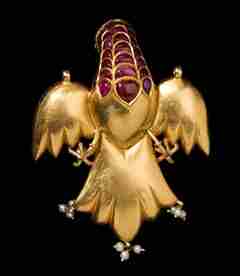De Nieuwe Kerk in Amsterdam presents highlights from one of the world’s most renowned collections of Islamic art. Titled ‘Passion for Perfection’, the exhibition will include some 500 objects from the collection of Professor Nasser D. Khalili.
 On view through April 17 2011, De Nieuwe Kerk glitters with richly illuminated Qur’ans and manuscripts, paintings, gold, jewels, textiles, ceramics, glassware, lacquerware, metalwork, and wood carvings.
On view through April 17 2011, De Nieuwe Kerk glitters with richly illuminated Qur’ans and manuscripts, paintings, gold, jewels, textiles, ceramics, glassware, lacquerware, metalwork, and wood carvings.
These are works of great historical and artistic value, illustrating the refinement and grandeur of Islamic art and bearing witness to a quest for perfect craftsmanship.
Passion for Perfection shows that Islamic art is a masterly expression, not of a single national culture or civilization, but of the many peoples joined by Islam for more than 1,400 years.
At the same time, the exhibition demonstrates the passion and expertise of Professor Khalili, who has assembled an unrivaled private collection of exceptionally fine Islamic art objects.
The exhibition designer is Siebe Tettero, particularly known for his work for the Van Gogh Museum, the Rijksmuseum in Amsterdam, and the fashion house of Viktor & Rolf.
The central theme of Passion for Perfection is the beauty and exquisite workmanship of Islamic art.
The Islamic world is highly diverse, geographically and culturally, and more than thirteen centuries of Islamic artistry are represented in the Khalili Collections.
It includes masterpieces from all over the Islamic world: from China and India to Iran and Iraq, from Egypt and Tunisia to Turkey and Spain.
The term ‘Islamic’ does not imply that all these works of art were made specifically for religious purposes; it is their artistic language that is rooted in Islamic philosophy, often reflecting local culture and traditions.
Besides calligraphic decoration and geometric patterns, arabesques and elegant scrollwork, there is also a strong emphasis on representations of humans and animals, the latter tolerated only in secular contexts.
Many such representations are found in miniature paintings and in virtually all of the branches of the decorative arts.
The exhibition is divided into themes such as Captivating Calligraphy, with magnificent illuminated Qur’ans and rare manuscripts dating from the 10th to the 19th century, Shining Showpieces, with ingeniously fabricated jewellery adorned with precious stones, as well as colourful enamels that belonged to India’s Mughal rulers, and Delicately Drawn, with the finest miniatures from Iran and India.
One highlight is the Jami‘ al-Tawarikh, the first survey of Muslim history, written from the perspective of the Mongol conquerors by Rashid al-Din in 1314’1315.
Source: Art Daily [January 01, 2011]